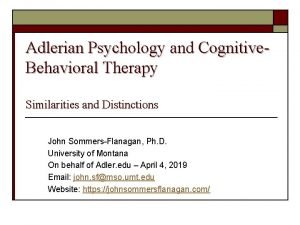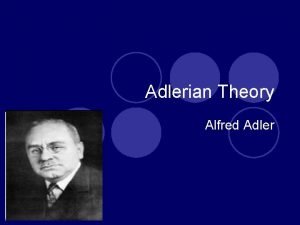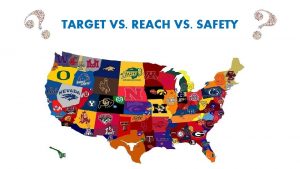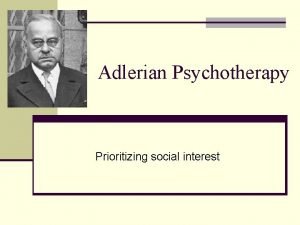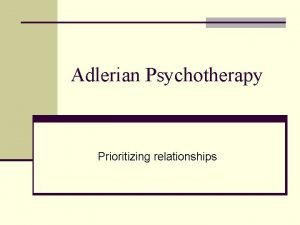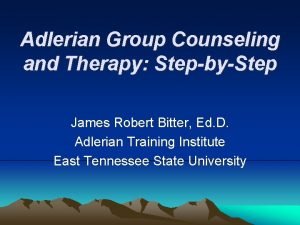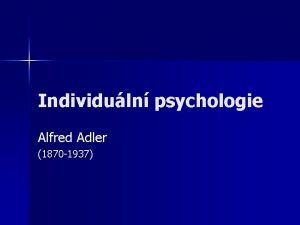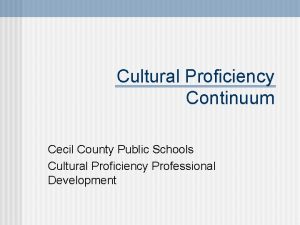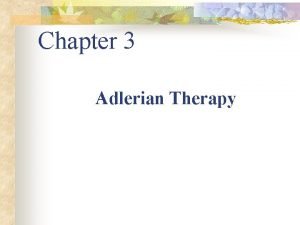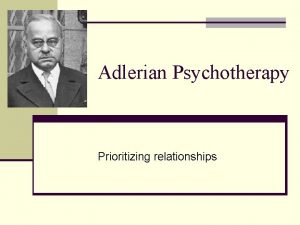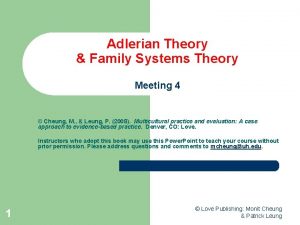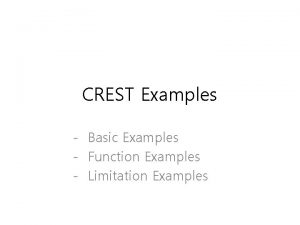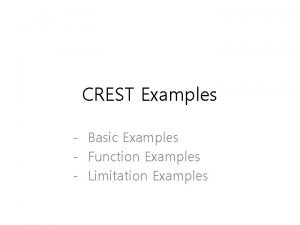Examples of Adlerian Theory in Use in Schools











- Slides: 11

Examples of Adlerian Theory in Use in Schools Haley Downing

Adlerian Play Therapy (Ad. PT) • Negative relationship between lack of early intervention and trouble in teen years and beyond • Child-centered play therapy (CCPT) is used frequently to manage disruptive behaviors in young students • Is Ad. PT as effective as CCPT? • (Meany-Walen, Bratton, & Kottman, 2014)

Ad. PT continued • K-3 grade students • Disruptive behaviors and teacher stress were both studied • Experimental group: met for 30 minutes twice a week • Control group: engaged in bibliotherapy for 30 minutes twice a week • Teachers and observers blind to which treatment students were receiving • Instruments: Teacher’s Report Form (TRF), Direct Observation Form (DOF), Index of Teaching Stress (ITS) • (Meany-Walen, Bratton, & Kottman, 2014)

Ad. PT continued • Experimental group showed moderate to large improvements • 67% of students functioning at clinical or borderline levels pre-treatment were functioning in normal range posttreatment • Teacher stress decreased more when Ad. PT was used • Barriers to implementing Ad. PT in schools: shortage of school counselors, lack of training, lack of financial resources, lack of administrative buy-in • Advocate: Educate stakeholders about importance of early intervention and show evidence for Ad. PT • (Meany-Walen, Bratton, & Kottman, 2014)

Use with Minority Students • School counselors must take into account cultural and social differences of students in order to be effective • Minorities, specifically African American students, still face prejudice and discrimination today • 4 stages of Individual Psychology that are helpful with minorities • • Establishing empathic relationship Helping to understand lifestyle, beliefs, and feelings Helping develop insight into behaviors Helping commit to change and initiate alternative behaviors • (Sapp, 2010)

Stages 1 -2 • Stage 1: Develop Empathic Relationship • • Goal-setting Contracts Encouragement Focus on Positives • Stage 2: Helping understand lifestyle, beliefs, and feelings • Thoughts lead to feelings, which lead to actions • Assess how priorities are expressed in student’s life: comfort, pleasing, control, superiority • Identify mistaken beliefs • (Sapp, 2010)

Stages 3 -4 • Stage 3: Helping Develop Insight into Behaviors • Explore mistaken beliefs • Encouragement • Confrontation • Stage 4: Helping Commit to Change and Initiating Alternative Behaviors • Action Phase • Encouragement and support • (Sapp, 2010)

Consultation with Parents • Behavioral Consultation (CBC) • Parents and counselor are both cooperative consultees • Four characteristics: Use of standard problem solving procedures, use of behavioral assessment techniques, use of behavioral intervention strategies, evaluation based on behavioral analysis • Adlerian Parent Consultation • Problems result when student feels like he/she don’t belong • Consultant and consultees are equals • 4 stages: Developing relationship with parents, problem identification, exploration, formulation of plan • Interventions focus on how parents can encourage child, logical consequences for misbehavior, modifying parent’s role in child’s misbehavior • (Holcomb-Mc. Coy & Bryan, 2010)

Consultation with Parents continued • Values-based Consultation • Response to need for culturally-sensitive consultation • Parents are experts on their children, not consultant • Community representation in consultation process • 6 steps • • • Create partnership with parents Clarify values, vision, and working principles Identify and merge strengths of partners and approaches Define problem collaboratively Research collaboratively Evaluate collaboratively • (Holcomb-Mc. Coy & Bryan, 2010)

Consultation with Parents Continued • Individual empowerment fostered through critical consciousness-process of action and reflection composed of group identification, group consciousness, and perceiving self as capable of working to change social landscape • Community empowerment- achieved via validation and social capital- social networks and resources that facilitate trust and achievement • (Holcomb-Mc. Coy & Bryan, 2010)

References • Holcomb-Mc. Coy, C. , & Bryan, J. (2010). Advocacy and empowerment in parent consultation: Implications for theory and practice. Journal of Counseling & Development, 88, 259 -268. • Meany-Walen, K. K. , Bratton, S. C. , & Kottman, T. (2014). Effects of adlerian play therapy on reducing students’ disruptive behaviors. Journal of Counseling & Development, 92, 47 -56. • Sapp, M. (2010). School counseling for african american adolescents: The alfred adler approach. Multicultural Learning and Teaching, 5(2), 60 -72.

